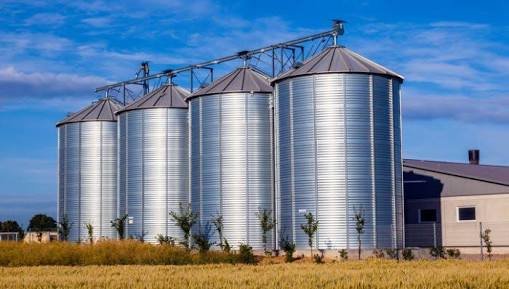Investment in storage systems: Key to reducing Post-Harvest losses, supporting farmers. By Michael Adedotun Oke

Investment in storage systems: Key to reducing Post-Harvest losses, supporting farmers

Most farmers harvest their produce and transport it to markets to earn a profit, often spending the money on immediate needs. However, they often overlook the importance of preservation and the need for adequate storage facilities.
By adopting an investment mindset towards the construction of storage facilities, farmers could significantly benefit from improved food distribution during off-seasons and unexpected harvesting periods. This approach not only supports food preservation but also generates income during the off-seasons of various agricultural productions.
To achieve this, it is crucial to leverage the construction of high-quality warehousing systems and involve the private sector in financing the acquisition of agricultural storage facilities. This involvement is particularly important given the seasonal fluctuations that affect the nation’s food distribution.

Building Storage Systems: Involving the Private Sector
There are many opportunities available in the agricultural sector, particularly in investing in storage facilities. However, the large amount of agricultural products lying around in most farming communities, not yet stored in facilities where they could ultimately become profitable for the farmers, remains a missing link.
Although a portion of the storage investment is highly valued and yields rewards, the advantages of farming items are often exported abroad for convenience. The facilitation of exports and their contribution to the nation’s overall growth can be enhanced by the presence of pre-fabricated storage facilities.

Even if the private sector can provide preservation pellets and medications to manage pests and diseases, as well as involve other stakeholders, technology needs to be transferred to the farmers. The role of extension services is also essential for providing the value-adding and demonstration needed to aid in preservation and reduce spoilage. This is crucial for implementing various value changes across preservation technologies and methods.
Establishing a Setting for Agricultural Product Processing
The creation of storage systems connected to processing centres and technological spaces also improves productivity and the conversion of agricultural products into marketable products.
These factors make a conducive atmosphere essential for the success of processing units. Consistency will boost exports and provide Nigeria’s growing population with access to nutritious food. It is imperative to maintain a connection with farmers, producers, and investors at all times and throughout all phases.
Advancing the Nation’s Development of Innovative Preservation and Storage Facility Technologies
There have been significant food surpluses during the harvest season, but throughout the off-season, a large portion of agricultural products is not available for human consumption. This is unacceptable as it leads to food wastage. A clear strategy regarding production and cultivation is necessary.
It is important to recognise the various obstacles that farmers face to maximise profits during drought, and it is unfortunate that they have to endure such challenges.
Additionally, there should be strategies to support the development of different storage systems in the country, such as barns for storing fresh yam, cribs for storing cereals, bins, bags/polythene bags, rhombuses, shelves, pits/underground storage, plastic containers, and earthen pits.
Motivate Agricultural Producers to Store Their Products
It is concerning that some farmers still feel compelled to sell their various agricultural products during the harvesting season, despite the existence of methods to preserve these products, such as selecting the best crops and livestock breeds for retention rather than selling them off during the off-seasons. It is also crucial to choose the best crops and livestock breeds and keep them for planting and rearing throughout the off-seasons.
Farmers should be encouraged to develop the habit of considering how to store their produce. However, it is also critical to consider methods for removing moisture content, as this makes it easier to preserve, lowers the risk of spoilage and deterioration, and extends the shelf life of agricultural products.
Finally, they need to know how to add value and assist in preserving agricultural products in a year-round and seasonal manner, extending their shelf life across all types of agricultural products in the nation. This storage involves the duration, size, and principles of storage systems, and includes classifications such as small, medium, and large-scale storage.
Why Should Agricultural Storage Systems Be Improved?
Even though farmers engage in various farming activities and practices, it is crucial that they develop the habit of storing their produce to ensure food availability all year round. This will help Nigeria afford quality food throughout the year, prevent food spoilage due to pests and diseases, preserve food quality for later use, and store viable seeds for future planting seasons.
A number of factors influence farm products, including microorganisms like bacteria, fungi, and yeast, whose activities can lead to colour deterioration, off-flavours, increased moisture, wet spots and mouldiness, and loss of viability.
Weevils, the most prevalent insects in grains, target seedlings, bore into them, and lay eggs in the seeds and storage structures, reducing the weight, quality, and quantity of the seeds. Insects, mites, and pests also attack stored materials and the wooden components of storage facilities.
Rodents devour grains, waste the remnants, and can also damage storage buildings and destroy stored goods. They contaminate stored materials and act as vectors.
Environmental factors, such as temperature, relative humidity, and moisture content, also play a significant role in storage.
Michael Adedotun Oke,
Project Facilitator, Talent Upgrade Global Concept, Michael Adedotun Oke Foundation, Plot 232 Kaida Road, Old Kutunku, Gwagwalada, Abuja, Nigeria
maof2020@gmail.com
+23408027142077




